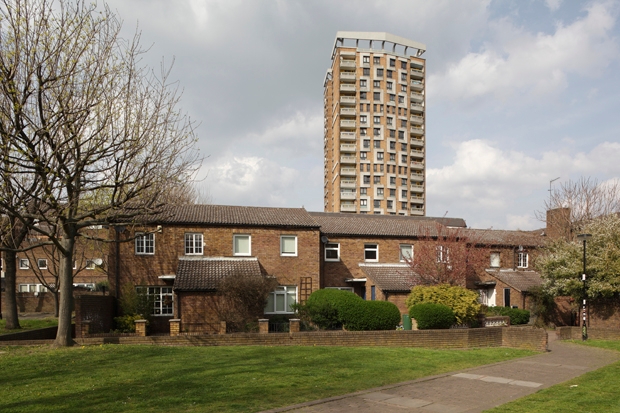Marina Lewycka’s latest happy-go-lucky tale of migrant folk in Britain takes a remark by the modernist architect Berthold Lubetkin as its epigraph: ‘Nothing is too good for ordinary people.’
In the vertical community within one of Lubetkin’s postwar blocks of flats in East London we meet hapless Bertie, resting actor caught on the hop by the spare-bedroom tax; disabled Len, thinking positive about his benefit reassessment; Violet, dreaming of her childhood in Kenya at her desk in a City insurance firm; and many more — some powering ahead in our new age of golden job opportunities and zero-hour contracts, others not so much. In fact, after his mother’s death, Bertie decides the only way he’s going to avoid homelessness is to find himself a mother-impersonator.
Enter steely, twinkling Inna, Ukrainian granny, who steals the show with her frequent culinary announcements: ‘I mekkit golbashky! From my country, best in world!’ — followed by the barked command: ‘Ittit!’ Inna’s terms of address are bigoted, in a friendly sort of way — Violet is greeted ‘’allo, Blackie!’ and Bertie, being unmarried in his forties, must be ‘homosexy’ — though, as she readily says, ‘It no problem wit me. Everyone is children of God. Anyways, I know nothing. In my country everybody normal!’
Berthold Lubetkin (whom the fictional Bertie is named after) studied in Moscow in the 1920s and never lost the conviction, typical of Soviet designers of the period, that architecture should be based not just on the modernist aesthetic, but on humanist values and social commitment. He imagined social housing that combined the latest comforts (lifts, central heating, balconies) with harmonious communal spaces: the sculptural curves of a Constructivist staircase, a ‘wind roof’ for drying clothes.
Britain’s postwar austerity resulted in radical economies to his social housing plans. The shared services he had envisaged as part of his buildings (a nursery, a community centre) were dropped, and Lubetkin found successful ways of using pre-fab building materials to cut costs. We all know what the result was when poor imitations of Lubetkin’s modernist aesthetic, built with cheap materials, were rolled out across the country. Yet his early, properly financed creations, such as the Highpoint apartments in Highgate, still cause a stir whenever one goes on the market — a three-bedroom flat is worth over a million these days. Consider this, Mr Osborne: how many billions of public funds might have been saved if only the money had been spent in the first place.
In Lewycka’s tower block, developers are after the communal garden and ‘right-to-buy’ owners are packing in seven students to a flat, while the last council tenants quake at the arrival of the housing officer. In the warmhearted, gently ironic universe that Lewycka’s novels inhabit, however, all is never lost. Bertie will step out with a nice lady with a teddy collection. Inna will meet a handsome new Ukrainian boyfriend with a nose like a half-eaten pork pie. Even the one-legged pigeon will find romance. The rich might be getting richer while the poor become less and less able to afford a roof over their heads, but at least, as Inna would say, loff is free.






Comments